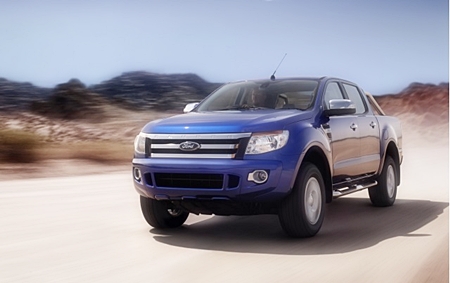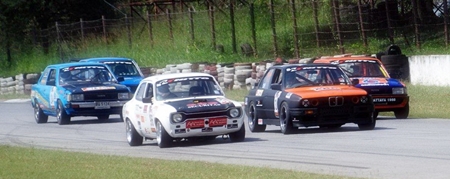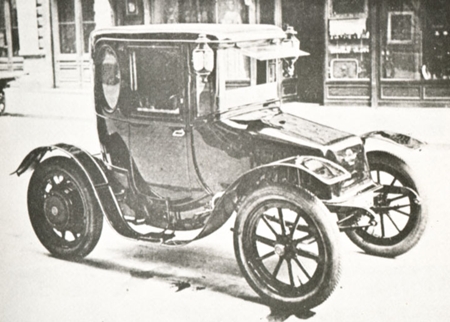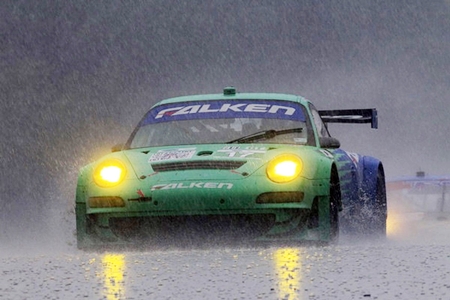 |
|
 |
| AUTO MANIA:
by Dr. Iain Corness |
|
|
|

New Ford Ranger
tops pick-up crash testing

New Ford Ranger.
The new Thai-built Ford Ranger pick-up just recorded the
highest ever scores for a pick-up in the Euro NCAP safety ratings and the
score of 89 percent even puts it right up amongst the safest sedans. For
adult occupant protection, the new Ranger scored 96 percent, putting it
alongside the Mercedes-Benz M Class luxury SUV. Even the pedestrian safety
rating at 81 percent is one of the highest ever recorded.
The Australian arm of FoMoCo is delighted, as much of the
design for this all-new pick-up was done in Australia, though it will be
built here in Thailand at the Ford Plant on the Eastern Seaboard, and
according to reliable sources, the vehicle was designed from the outset to
be a five star performer.
Of course, the proof of the pudding in Thailand will be
the safety statistics of Ranger pick-ups versus 125 cc motorcycles!
|
|
 |
What did we learn from the Abu Dhabi GP?
Well, we learned that for the first time Lady Luck deserted
Sebastian Vettel. Has his charmed life in F1 come to an end? Has Red Bull run
out of red rags to spur its drivers to victory? However, it was none of these,
but Mr. Pirelli will be having a few questions to answer as to how one of its
tyres suffered instant deflation. However, it will take a forensic pathologist
to take the scraps of rubber that were left to work out just what happened.
Michael Schumacher also had a puncture and was unable to complete the slowing
down lap. So all that we know from Abu Dhabi is that Pirelli make some tyres
that are miles better than their other tyres and get punctures.
With this silly rule that all drivers must race on both the
‘fast’ tyre and the ‘slow’ tyre, this is like saying that at some stage in the
race all drivers must race with one hand tied behind their backs. This is not
“motor racing”. It is time that the FIA stipulated one tyre for the entire race
for everyone.
After Vettel’s demise on the first lap, Lewis Hamilton
(McLaren) seized the opportunity that Pirelli had given him and remained
comfortably ahead of the chasing pack, led by Fernando Alonso (Ferrari). Having
been the quickest runner all weekend, it was a deserved victory for Hamilton.
Drive of the day, in my opinion, came from Alonso. He did not
have the fastest car, but by dint of a brilliant start, hauled himself (from
fifth on the grid) up to second on the first lap, where he stayed for the entire
race. In the past I have been critical of Alonso, but his drives this year in
the Ferrari have been exemplary.
Third was Mr. Consistency, Jenson Button (McLaren), who has
matured so much in the past 12 months. Button had his problems during the race.
“It was a difficult race for me, as I had a KERS Hybrid issue, which is
admittedly very rare for us. After about 15 laps it stopped working - and that
doesn’t just affect your power out of the corners, it affects engine braking
too. Fortunately, my engineer came over the radio and told me they’d found a way
to make it work again - but it meant pushing lots of buttons on the steering
wheel every couple of laps because it only returned intermittently. So I’d
arrive at a corner and not know whether I had any engine braking because I had
no warning. So selecting the right spot at which to brake was tough.” Button and
Mark Webber (Red Bull) had spirited dices and showed that clean wheel to wheel
racing is possible, something that Felipe Massa (Ferrari) is yet to learn.
Having two DRS zones one after the other just makes for a
pass, quickly followed by a repass. Order unchanged. The way F1 is going, with
the totally inept decision-making, they may as well institute a compulsory
Safety Car period every fifteen minutes, interspersed with watering the track.
Next step is to get rid of the bitumen and make the tracks on dirt, and then
call it Speedway F1. There’s far more action in speedway!
|

|
How did we go in the Nitto 3K Series at Bira?

Securitas Escort in close company
The Nitto 3K Series promoted the fifth round at the Bira
Circuit a couple of weeks ago. Despite some Bangkok competitors being unable to
come down because of the floods, there were still around 100 cars and trucks
racing.
Close racing was evident in all categories, and these ‘club’
style meetings are providing good entertainment for the spectators and at B. 50
to enter represents the best value for money motor racing around.
We compete in the Retro series (pre 1985) and the usual trio
of Henk Kiks (B-Quik Porsche 944 supercharged), Gavin Charlesworth (EBC Brakes
V8 BMW E30) and Urs Schonenberger (Proton Trading BMW E36) all were very equal
at the front, with one win each during the two day meeting.
Our Securitas Retro Escort Mk 1 had a high speed misfire that
defied diagnosis all weekend, but despite this we still came home with a third
and a fourth class place trophies, and enjoyed some very close racing. Our
weekend was made even more pleasurable with a sausage sizzle on the Sunday put
on by the Sausage King people. Thanks, Barry!
The next Nitto 3K meeting will be on December 10 and 11. Mark
it in your diaries!
|

|
Light weight technology.
Much publicity has been given to the new engine technologies,
with manufacturers offering hybrids and even pure electric cars to provide
financial savings in running the family vehicles.
However, there are other ways to reduce running costs.
Reducing vehicle weight is one very important factor. Traditionally, the
automotive industry has reduced weight primarily only by downsizing, a strategy
that has succeeded in cutting the weight of a typical car from 1700 kg to 1300
kg over the past 20 years.
Simple physics will tell you that a car with a lighter body
can use a lighter engine, less massive suspension, and a less elaborate
structure. These secondary weight savings can roughly double the benefits: for
every 5 kg saved by reducing the weight of the body, another 5 kg can be saved
by downsizing other parts of the car.
That was also the principle Colin Chapman instilled into
Lotus. However, most auto engineering design centers of a few years ago, felt
that to produce lightweight cars would require expensive lightweight materials.
Whilst this might be fine for low volume production (like Lotus), it was not a
practical goal for the mass market. It was easier to build more powerful engines
than it was to reduce weight. But that was before the world became the victim of
escalating petro-mania.
In 1993, energy technologist Amory Lovins of the Rocky
Mountain Institute suggested that major automakers could use existing materials
and technologies to produce an ultra-lightweight, highly fuel-efficient vehicle.
The ‘supercar’ he envisioned would incorporate lightweight plastics,
computerized controls, and a hybrid powerplant. It would weigh roughly 500 kg
and achieve well over 150 miles per gallon. Lovins felt it would, however, need
a revolution in the industry to change the engineering concepts of ‘power’,
rather than ‘weight’.
But as lightweight materials have become cheaper to
manufacture and use, their adoption in production cars has become more
widespread. Magnesium and aluminium alloys created car parts that were
cost-competitive with conventional components. An example is that BMW with their
Vision ED concept uses a magnesium block and they took 10 kg off the weight of
the engine.
BMW are not alone in the weight loss department. Bentley have
produced the new Supersports, which boasts a zero to 100 km/h time of 3.9
seconds, despite its weight of 2240 kg. However this all-up weight is over 110
kg lighter than the base model Bentley (if there ever is such a thing as a “base
model” Bentley)!
The Bentley exercise shed weight by firstly tossing out the
rear seats (26 kg saved), then another 45 kg was saved by replacing the
sumptuous leather front seats with new carbon fiber bucket seats (sourced from
the Bugatti Veyron). Carbon fiber disc brakes saved another 39 kg.
The Supersports features the same twin turbo 6.0 liter W12
(ex-VW) engine to other Continental models, and covers zero to 100 kph in 3.9
seconds.
Amory Lovins’ concept was made public 17 years ago, but the
technology direction he proposed has now been shown to be on the right track
(and that’s not racing track, but the everyday highways). Hybrids are definitely
here, and Toyota and Honda are expanding this technology throughout the range of
their vehicles (take a look at the tail end of the next Camry you see - it just
might say “Hybrid”.)
Fuel economy is becoming increasingly important in a world
that is afraid of crude oil shortages and increasing prices as the world’s
economic crisis hopefully passes. For example, BMW’s Vision ED will return 3.8
liters per 100 km. The production BlueZero vehicles from Mercedes-Benz are also
under 5 liters per 100 km, as are VW’s Blue Motion range.
The winds of change are upon us. Stylists are less important.
Engineers are more important, and technology will reign supreme.
|

|
Autotrivia Quiz

Quiz Car
Last week I mentioned that we are all familiar with traffic
lights (even though largely ignored in Thailand). The world’s first traffic
light was installed in Detroit in 1919, and I asked when was the first
three-color traffic light installed in the UK, and where? It was 1928 in
Wolverhampton.
So to this week. Look at the photo. What is it? Who designed
it? What year is it? What engine does it have?
For the Automania free beer this week, be the first correct
answer to email [email protected].
|

|
Falken sticks with Porsche

Falken well wet.
Tyre manufacturer Falken has announced it will return to the
ALMS (American Le Mans Series) next year with a 2012 specification Porsche GT3
RSR run by Derrick Walker. 2011 drivers Wolf Henzler and Brian Sellers also are
expected to return to the squad. “The new chassis makes us one of the first
teams in the world to have one of these incredibly sophisticated race cars,”
explains Andrew Hoit, Falken’s vice president of marketing.
The ALMS Falken team secured two class victories in the 2011
series, winning at Baltimore and the very wet Mid-Ohio round. The ALMS
confirmation follows Falken Europe’s recent announcement to return to the
Nrburgring 24 Hours and selected with VLN races with a Sven Schnabl-run Porsche
997 GT3 R in 2012. “Motorsports takes on multiple meanings for Falken,” added
Nick Fousekis, Falken’s director of motorsports. “We use all forms of racing to
help test, develop and market our products. Obviously, winning is the ultimate
goal, but it isn’t the only one. What we learn at the track helps make Falken
products that much better at the consumer level. For this reason alone, Falken
will remain deeply involved in motorsports and performance.”
|

|
|
|
 |
|
 |

